TIRANA, November 14
It will cost Lek 253 billion or Euro 2 billion to the state budget to pay off the public procurement contracts and the Public-Private Partnerships projects approved so far. Top Channel made a calculation based on the list of public investment and on 2019 state budget submitted to the parliament by the Ministry of Finance and Economy.
According to the documents, the transports sector accounts for most of the cost burden. More specifically, there are five contracts that consist of the maintenance of the Nation’s Road (Rruga e Kombit), and the construction of four new roads:
Thumana-Kashar
The Nation’s Road
Orikum-Dukat
Milot-Balldren
These five contracts will cost Lek 154 billion to the state budget.
Moreover, there are nine PPPs in the following sectors, healthcare, waste management, education, and fiscal auditing that will be financed by the state budget. Their cost is estimated at Lek 99 billion. Therefore, the cost of public procurement contracts financed by the state budget is Lek 253 billion. Almost the entire amount of money will be paid within the next 13 years.
This figure does not count out-of-pocket concession projects such as toll roads and marking that Albanians pay. Currently, there’s an annual cost of Euro 155 million, without calculating new contracts. This means that for the next 13 years, every Albanian citizen aged 0-100 will pay an annual average of Euro 53. It will change depending on population increase or decline.
Recently, the Transition Report 2018-2019 by the European Bank for Reconstruction and Development (EBRD) highlighted that major road projects are advancing amid concerns about the openness of procurement.
“The scheme, which envisages financing of the construction by contractors and repayment of long-term debt by the government, has been criticized by some observers, including the IMF, because of the potential for hidden liabilities for public finances and the fact that projects are based on unsolicited bids. Meanwhile, an attempt to introduce the first toll road in the country – the Durres-Kukes motorway – initially encountered significant resistance from local communities because of the perceived high cost of the tolls but came into force in September 2018,” the report highlighted.
News Source: TCh
Photo credit; Kuksi Turistik

Leave a Reply
You must be logged in to post a comment.